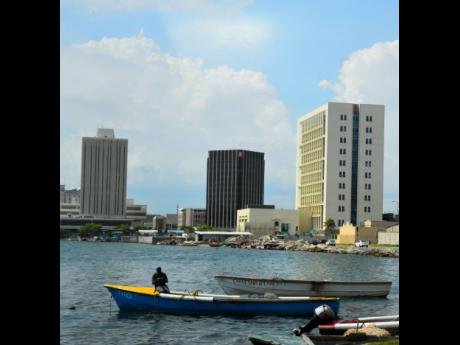$40b of state funds still held by commercial banks - IMF urges active monitoring to guard against misuse
Nine years after the Jamaican Government put in place legislation to prevent leakage of taxpayers’ funds by creating a single account at the Bank of Jamaica, more than $40 billion of the state’s resources are still being held in commercial banks.
There are a large of number of bank accounts – more than 3,000 – containing significant funds residing outside the treasury single account system, the TSA, creating room for misuse of government funds, according to the fifth review under Jamaica’s standby agreement with the International Monetary Fund (IMF) released last week.
Jamaica implemented a central treasury management system (CTMS) starting in November 2012, after amendments to the Financial Administration and Audit Act in 2009, to replace the dispersed cash and treasury management systems in government.
The CMTS involves the operation of a single treasury account at the central bank by the Accountant General’s Department, replacing the expenditure clearing accounts of ministries, departments, and agencies held at commercial banks.
Commenting under the heading public financial management and controls, the IMF country report said that transparency and accountability are hindered due to the lack of published audited financial statements, which it notes are the primary means for assessing the Government’s use of public resources.
Central government budget execution reports are published on a monthly basis, but they do not provide a full picture of the state of government finances and they are not audited.
While the Government had committed to completing a review of its bank accounts in commercial banks outside the TSA by December 2018 and determine suitable policy actions by June 2019, it was the first IMF report in which the holdings were quantified.
The report said that there are more than 3,000 commercial bank accounts residing outside of the TSA with government funds totalling around two per cent of GDP, or about $40 billion based on Jamaica’s GDP of approximately US$15 billion. The accounts include those falling under the responsibility of ministries and departments.
RISK OF MISUSE
“Such large amounts outside the TSA increase the risk that government funds are misused and reduce the efficiency of budget planning and cash management,” the IMF said.
Of the 3,000 accounts, over 2,000 are operated by universities, colleges and schools, which the current legal framework allows to remain outside the TSA.
“However, although individual account balances are small, they pose a risk since oversight is weak and compounded by commingling of government and donor funds (i.e., alumni and parent associations),” the IMF report added.
The Government transfers funds in blocks to schools that, in turn, make payments to suppliers and beneficiaries directly using commercial accounts rather than through the centralised platform used for regular government payments for goods and services.
The IMF recommended that audited financial statements should be published on a timely basis in line with international accounting standards, including all revenues, expenses, assets, and liabilities.
It also recommended that all government-related commercial bank accounts should be eventually migrated to the TSA at the central bank.
The Fund suggested that in the interim, those accounts should be actively monitored, including through the adoption of Integrated Financial Management Systems, that greatly improves reporting and monitoring capabilities.
It said monitoring and the migration process should be led by the Accountant General’s Department to which monthly bank reconciliation statements should be submitted.
It also recommended that the Government create TSA sub-accounts for ministries, departments and agencies at the BOJ, begin migrating funds and close redundant commercial bank accounts.
For universities, colleges, and schools, the IMF suggested that separate ledger accounts be kept for budget and non-budget funds and that they provide quarterly reports on the balances in the budgetary fund ledgers to the AGD.
It also suggested that schools be brought into the CMTS system, thereby facilitating direct transfers between the AGD and suppliers, and that government funds from schools’ commercial bank accounts be removed.
mcpherse.thompson@gleanerjm.com

